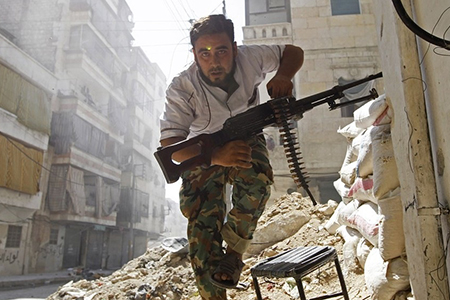| |
 |
 |
 |
| The story so far... |
 |
| You're currently on our features and projects pages, with material ranging from the satirical to the theological. For more features, click here. |
| |
|
|
 |

Photo by a.anis |
 |
| The persecution of Syrian Christians that didn't happen |
 |
The BBC has been awash with programmes marking the centenary of the start of the First World War. Next year will almost certainly see more dramas and documentaries, perhaps marking the sinking of the Lusitania or the ill-fated Dardanelles campaign. But one centenary that will probably receive very little attention in this country is the "other" Holocaust of the 20th century: the terrible Armenian Genocide.
THE TURKISH MASSACRES and ethnic cleansing of Armenian Christians in 1915 led to at least one million deaths and many hundreds of thousands fleeing to neighbouring countries. The charity I lead, formerly known as BibleLands, has its own history intertwined with that of the Armenians. We were established 160 years ago as the Turkish Missions' Aid Society. Our objective was to support American evangelical missionaries in their work among Armenian Christians.
When the Armenians were scattered after the genocide, many of them to the Levant, our work followed them. This explains our focus on the Middle East today, albeit on supporting the social witness of the indigenous Christians of the region, rather than evangelisation.
One reason why the centenary of the Armenian genocide may well receive little attention in the UK is that no one can ever quite get to the truth of what happened in 1915. Some historians put the death toll at much lower than one million. Others put it higher. Turkey, a key ally of the West and a candidate for EU membership, denies that deliberate genocide took place at all. It admits that while many Armenians were killed, this was all in the context of the wider conflagration that was the First World War.
So we come back to the famous saying of Aesychlus, the ancient Greek dramatist: 'In war, truth is the first casualty'. This aphorism came to my mind again this week, and also in relation to the Armenian Christians. But in an unexpected place: at the Spring Harvest Christian conference in Somerset.
I was in the 'big top' with maybe 4,000 other Christians and a speaker told us of terrible news just received from Syria: 80 Christians had been killed and thousands more forced to flee after Islamist rebels had taken a town near the Turkish border. A quick glance at the websites of two well-known Christian charities focused on persecuted Christians would have confirmed the awful news. So we all prayed hard for Syria and its hard-pressed Christian community.
It is of course absolutely right that we should continue to pray for Syria and for an end to the civil war. And we should pray for the safety of all Syrians, both Christian and Muslim. But let's make sure we have all the facts. And the curious fact is that – and the speaker at Spring Harvest could not have known this – the reports of atrocities in Syria were simply not true.
The town in question was the strategic border town of Kessab. It has a mostly Christian population, largely Armenians whose families had fled the 1915 massacres in Turkey. The town had indeed fallen to the Syrian rebels, including Islamist groups, at the end of March. Many of the town's residents, both Christian and Muslim, had fled to the nearby city of Latakia, but more out of fear of what government forces would do when they tried to retake the town, which they attempted (unsuccessfully) within days.
Many of the elderly residents of Kessab stayed in their homes and were reportedly well treated by the rebels. There were no jihadi atrocities and certainly no evidence of 80 Christians being killed. There was one confirmed incident, where an 'over-zealous rebel fighter' was reported to have removed a cross from one of Kessab's churches. He was disciplined by his commanders.
But the half-truths emerging from Kessab were quickly inflated to become a gospel certainty which served only to feed the Islamophobia of many in the West. The plight of the persecuted Christians of Kessab was taken up by Armenian-origin celebrities in the US such as Kim Kardashian and Cher, who started tweeting with the #SaveKessab hashtag.
"Innocent Christians and Armenians being killed by turks" tweeted Cher, referring to the fact that the Syrian jihadis were believed to have received assistance from the Turkish government.
The fact remains that it is very difficult to be categorical about what is happening inside Syria. Each side puts its spin on events, and with few Western journalists on the ground, hard verifiable facts are few and far between. We hear a lot about the persecution of Christians inside Syria, and this is certainly happening in places. But why is the Western media ignoring the fact that 'secular' Muslims, being more numerous in the region, suffer proportionately greater persecution from Islamists?
On 2 April the Assembly of Catholic Ordinaries in the Holy Land issued a press release calling for more balance in the coverage of 'persecution' of Christians in the Middle East. It warned: "The repetition of the word 'persecution'... usually referring only to what Christians suffer at the hands of criminals claiming to be Muslims, plays into the hands of extremists."
The media in the West, and maybe even some of us Christians, would do well to take note. |
|
|
 |
 |
 |
| Jeremy Moodey is Chief Executive of Embrace the Middle East, the inter-denominational development charity which tackles poverty and injustice in the lands of the Bible |
 |
| Give to Embrace's Syria Crisis Appeal |
 |
| The Syrian-born Patriarch of the Melkite Greek Catholic Church, His Beatitude Gregorius III, will give Embrace's annual lecture at St James's, Piccadilly, on 20 May 2014 |
| |
|
|
|
|


